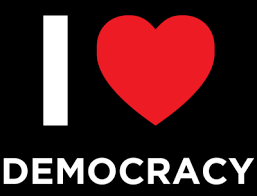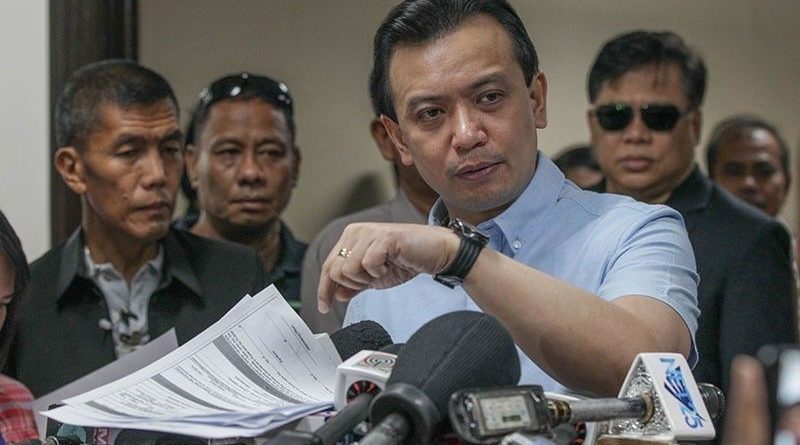DEMOCRACY-FREEDOM: MANILA- Trillanes wins at Court of Appeals: Ruling reviving rebellion case reversed

MANILA, Philippines (Updated 2:25 p.m.) — The Court of Appeals granted former Sen. Antonio Trillanes IV’s bid to reverse the Makati court’s ruling that revived the rebellion case against him over the supposed revocation of amnesty granted to him and others from the Magdalo group during the Aquino administration.
The Court of Appeals Sixth Division granted Trillanes’ petition for certiorari challenging the Makati Regional Trial Court Branch 150’s orders dated Sept. 25, 2018 which granted the Department of Justice’s plea for an arrest warrant against the senator, and the subsequent Dec. 18, 2018 order that upheld it.
.

READ: Makati court orders Trillanes’ arrest for rebellion case
The Sept. 25, 2018 order effectively revived the rebellion case against Trillanes over the Manila Peninsula siege in 2007. The court, then under now-retired Judge Elmo Alameda, said Trillanes “failed to convince the Court that he indeed complied with the minimum requirement” in applying for amnesty, effectively reviving the case against the senator.
The CA ordered the reversal of two Makati court orders that effectively reopened the trial. “The assailed orders…having been issued by the respondent court that no longer had jurisdiction on a dismissed criminal action and that acted with grave abuse of discretion, are set aside and vacated,” the order read.
Trillanes, in a statement, thanked the CA justices who wrote the ruling. “Today, the rule of law prevailed… Sana all na judges and justices ay may ganitong sense of justice to check the prevailing authoritarianism in the country,” he added.
Associate Justice Apolinario Bruselas Jr. penned the decision, with concurrences from Associate Justices Marie Christine Azcarraga-Jacob and Angelen Mary Quimpo-Sale.
.

CA: Makati court committed grave abuse of discretion
In resolving the petition, the CA said that a conditional amnesty, which was granted to Trillanes, may be revoked “if it is later found that the grantee breached the conditions upon which the amnesty was granted or if it becomes known that he failed to fulfill them originally.”
In Trillanes’ case, President Rodrigo Duterte in 2018 issued Proclamation 572 stating that the amnesty was void from the beginning as the senator did not admit guilt—an admission of guilt was included in the application form for amnesty, but the military says it has no record of Trillanes filing one.
The CA pointed out that the DOJ did not file an action for the annulment of or the relief from the Makati court’s Sept. 7, 2011 ruling that dismissed the rebellion case against Trillanes. The government lawyers also did not move for the invalidation of the order through a certiorari.
The order that dismissed the case was also assailed through the Omnibus Motion filed in the case which prayed for the issuance of a warrant of arrest, the CA said.
“Tested against the outlined procedural standards above, the remedy resorted to by the DOJ cannot be anything else but irregular and improper. The respondent court gravely abused its discretion when it took cognizance of DOJ’s Omnibus Motion, set aside its Order of [Sept. 7, 2011] and revived the criminal action against the petitioner,” the ruling read.
The appeals court also said that to look into whether the September 2011 ruling is a void judgment would require an inquiry into the factual basis of Proclamation 572. A full, evidential hearing should be held, it added.
.

RELATED: A duel of documents: DOJ, Trillanes cite different rulings
It noted that the Makati RTC Branch 150 merely conducted a summary hearing, while Branch 148—which dismissed DOJ’s plea which sought a warrant based on the same Duterte proclamation—conducted a full evidentiary hearing.
The Makati Branch 148 also received documentary and testimonial evidence including from then-officials of the defense department and those who witnessed the submission of the amnesty application, while Branch 150 “limited itself only to hearing oral arguments and receiving affidavits.”
.

READ: Makati court denies DOJ plea for Trillanes arrest
“We are of the view that, had only one approach been taken, one that allowed the reception of evidence in full measure, common answers to common questions of facts would have been elicited,” it added.
“A revoked amnesty can render void an order or judgment that dismissed a criminal action because of the amnesty, but the process entails a proper judicial inquiry which either party of the controversy, be it government or grantee, may initiate via the proper legal tools and remedies with the proper court clothed with jurisdiction,” the CA held.
.

Constitutionality of Proclamation 572
The same ruling however touched on constitutional issues Trillanes raised against Duterte’s Proclamation 572, such as whether the delcration was a bill of attainder and ex-post facto law, which are prohibited by the Constitution.
A bill of attainder is a legislative act that inflicts punishment without a trial, while ex post facto law is that would penalize a crime that was committed when the act was not deemed illegal yet.
But the CA said the proclamation is not a bill of attainder nor an ex post facto law, as the declaration is an executive act.
It added that the revocation of the conditional amnesty “does not impute guilty upon the accused and does not seek to inflict punishment without judicial trial.” The Proclamation, which revoked the conditional amnesty, merely allows the continuation of proceedings against the former grantee, the court also said.
Procalamation 572 “does not and will not place the petitioner in double jeopardy” as Trillanes argued, the court said.
The double jeopardy rule essentially states that when a case against a person is terminated, the same accused cannot again be charged with the same or identical offense.
The CA said that in Trillanes’ case, the rebellion case was dismissed due to his ex-parte motion to dismiss. “Considering that the first jeopardy did not attach when Criminal Case No. 07-1326 or the rebellion case was previously dismissed, any consequent action against the petitioner for the same crime of rebellion will not expose him to double jeopardy,” the ruling read.
Duterte’s proclamation did not violate Trillanes’ right to due process nor does it violate the equal protection clause, the CA said.
The court pointed out that the proclamation as it did not assume authority to direct a warrantless arrest.
Whether these issues and the ruling would be taken up for an appeal will be up for the Office of the Solicitor General, Justice Secretary Menardo Guevarra told reporters.
It was Solicitor General Jose Calida who initiated the review of the amnesty granted to Trillanes.
While Guevarra said he has not yet read the decision, he said he knows “that the issues are exclusively jurisdictional in character.”
“I will leave it to the [OSG], as counsel for the government, to determine the appropriate legal remedy, which may include a motion for reconsideration with the court of appeals or a petition for review with the Supreme Court,” he added.











